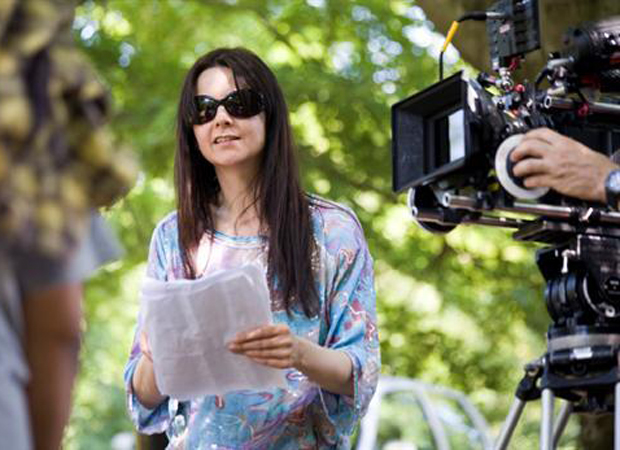
Gillian Wearing's X Factor
Her Self Made film launches new acting careers
As you may know by now, Turner Prize winning artist Gillian Wearing’s first film for cinema Self Made started with an advert she placed in the back of a free newspaper which read: ‘Would you like to be in a film? You can play yourself or a fictional character. Call Gillian.’ The resulting film was quite brilliant, simply executed yet incredibly complex not least for the range of emotions it unleashed in the members of the public who appeared in it (and some of those who watched it).
But it also seems to have inadvertently launched the acting careers of some of those participants, all members of the public remember, rather than actors, as the artist herself told us when we caught up with her last week.
“I’m friends with the participants now and I see quite a few of them regularly, everyone keeps in touch,” she told Phaidon. “The friendship grew out of the three weeks of filming. Outside of the workshops and end scenes we all had a really good social time, we had a karoke night, a party and a quiz night that was actually a blast! Everyone is incredibly proud of their performances and they should be, they went from non-actors to actors in a very short space of time. In fact Ash (Akhtar) has been in several short films and now attends Sam’s classes." (Sam Rumbelow, a method acting coach who worked on Self Made). "Dave (Austin) was headhunted for a fictional TV drama, James (Baron) has been offered some sponsorship to sing, Jerome (Prince) is a judge on a soon-to-be televised talent show as well as acting in a TV drama and Simon (Mansey) has also been in short films.”
Of the 2000 people who responded to Wearing’s advert, seven were chosen to create and star in their own micro-drama. They each took part in an intense three weeks of method acting workshops where they explored their innermost anxieties and memories which then became the subject of their short films. Warehouse worker Dave Austin’s piece saw him playing Italian dictator Mussolini while Lian Stewart explored her troubled relationship with her father. Self Made is currently touring the UK and the US and is set to play in selected cinemas across Europe next month. We strongly urge you not to miss it. While we had her attention, we asked Gillian a few more questions about the film.
Self Made, like other films of yours, involved getting people to reveal their fantasies, emotions and anxieties. How did you go about making people feel comfortable with you? “First of all the advert was important. I believe adverts are the best way to find respondents, because normally only people apply who are interested in the concept of the idea expressed in the advert. Then via a more descriptive follow up in email and audition they are able to make an informed choice of whether they would like to partake. The participants that were chosen were already open and honest people, comfortable within their own skin; the only thing they needed to feel comfortable with was performing, as they were all non-actors. That was where with Sam’s unique skills the participants were able to go from performing to camera/audience to performing in an intimate and truthful manner.”
You asked them theirs, but what’s your big inhibition? ” Public speaking is definitely where I am inhibited due to my fear of inarticulation. So I avoid public speaking as much as I possibly can. Although with Self Made I progressed into being OK at it. I would never be able to stand up and give some anecdotal story to an audience, even if it was at a friend’s wedding, in fact I read a poem at a friend’s wedding and it was excruciating! You could at least say I tried! But I do think there has been a lot of progress in my sense of confidence since I addressed this inhibition.”
What the individuals reveal is intense and disturbing. Did you feel a sense of responsibility about the thoughts and feelings you might be uncovering? “All the confessional moments occurred without prompting, none of it was a first time revelation for that person. So nothing was uncovered for the first time, and none of it came through the technique of method it was always at a moment when a conversation was occurring, and the participant wanted to talk.”
Is there one of the five that you think is particularly important? “They all affect me in different ways. One important aspect of the film was that it wasn’t about a competition. The end scenes are only part of the story the workshops produced some brilliant acting as well.”
The exploration of their emotions must have been a revealing and therapeutic process for the subjects. How much is the film about therapy? “No, the film is about Method acting. As a visual artist Method makes sense to me because all art normally relates to some biography. An actor doesn’t have a canvas or a camera they only have their bodies to channel memories and emotions that feel real, this is what writers, poets, artists and musicians do all the time. It’s hard to see the process in the more passive forms just mentioned but with acting (which is about action) you can see how a method evolves from using something personal to create a fictive character.”
Finally, have you changed the way you approach your work after the experience? “You learn so much when you make a feature length film and I am sure that will help me in my artwork. I would like to make another feature film but I will always be an artist.”
For upcoming UK screenings of Self Made, click here